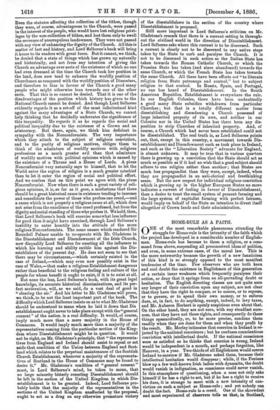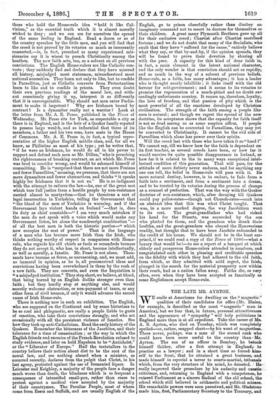HOME-RULE AS A FAITH.
ONE of the most remarkable phenomena attending the struggle for Home-rule is the intensity of the faith which the project has developed in a considerable number of English- men. Home-rule has become to them a religion, or a com- mand from above, suspending all preconceived ideas of politics, and even, in some extreme eases, of the moral law. This is the more noteworthy because the growth of a new fanaticism of this kind is so strongly opposed to the most manifest tendencies of the time. Few observers who are both keen and cool doubt the existence in Englishmen of this generation of a certain inner weakness which frequently paralyses their action, or deny that it springs from an all-pervading doubt or hesitation. The English directing classes are not quite sure any longer of their conviction upon any subject, are not clear that they have the right to conquer, or to coerce, or to repress, or to govern, or to spend their own money, or to enforce dues, or, in fact, to do anything, except, indeed, to levy taxes, and Mr. Auberon Herbert is openly suspicious even about that. On the other hand, they are not sure, with any steadfast sure- ness, that they have not these rights, and consequently do these things spasmodically, or, to be more precise, condone them readily when they are done for them and when they profit by the result. Mr. Morley intimates that coercion in Ireland is re- jected by the national conscience ; but he confuses conscientious conviction with intellectual doubt. If the national conscience were as satisfied as he thinks that coercion is wrong, Ireland would be independent in a month, and perhaps forgotten, like Hanover, in a year. Two-thirds of all Englishmen would coerce Ireland to-morrow if Mr. Gladstone asked them, because their intellectual hesitation would disappear ; while, if the Fenians blew up a few well-known Irish ladies with dynamite, the doubt would vanish in indignation, as conscience could never vanish. In this atmosphere of questioning, when a man not only asks himself if he has a right to act, but if he has a right to receive his dues, it is strange to meet with a new intensity of con- viction on such a subject as Home-rule ; and yet nobody can doubt the fact. Home-rule is a creed. One of the shrewdest and most experienced of observers tens as that, in Scotland, those who hold the Home-rule idea "hold it like Cal- vinism," as the essential truth which it is almost morally wicked to deny ; and we can see for ourselves the spread of the same feeling in England. Read a dozen or so of the country speeches by the little men, and you will find that the creed is not proved by its votaries so much as incessantly reasserted,—is, in fact, preached as many experienced mis- sionaries say it is wisest to preach Christianity among the heathen. The new faith acts, too, as a solvent on all previous convictions. The English Home-rulers are like Catholic con- verts; they suddenly find and declare that they have misread all history, misjudged most statesmen, misunderstood most national necessities. They learn not only to like, but to confide in Parnellites, just as Catholic converts from Protestantism learn to like and to confide in priests. They even doubt their own previous readings of the moral law, and with- out consciously giving it up, interpret it so differently that it is unrecognisable. Why should not men enter Parlia- ment to make it impotent ? Why are Irishmen bound by contract? Is a dynamiter really not a warrior Look at the letter from Mr. A. E. Pease, published in the Times of Wednesday. Mr. Pease sits for York, as respectable a city as there is in England, and is the heir of a Quaker family reputed to possess large wealth, and so influential that three of its members, a father and his two sons, have seats in the House of Commons. Mr. A. E. Pease is, in fact, a typical repre- sentative of the higher English middle class, and, for all we know, as Philistine as most of his type ; yet he writes that, "if he were an Irishman, he would do all in his power to support and defend such men as Mr. Dillon," who is preaching the righteousness of breaking contract, an act which Mr. Pease was bred to consider wrong, and would be ashamed himself of committing. He is "surprised that there are not more Fenians and fewer Parnellites," meaning, we presume, that there are not more dynamiters and fewer obstructives, and thinks "it speaks highly for Irishmen that it is not so." He is so indignant with the attempt to enforce the law—he, one of the great sect which tore full justice from a hostile people by non-resistance carried almost to martyrdom—that he threatens a sort of legal insurrection in Yorkshire, telling the Government that "the blood of the men of Yorkshire is warming, and if the Government lays violent hands on Ireland "—that is, does its duty as chief constable—" I am very much mistaken if the men do not speak with a voice which would make any Government listen, let alone the nondescript combination "- of all the best men in both the historic parties—" which now occupies the seat of power." That is the language of a man who has become more Irish than the Irish, who thinks nothing worthy of respect in comparison with Home- rule, who regards his old chiefs as fools or scoundrels because they do not accept it, who has, in short, become intellectually, as well as morally, a fanatic. Mr. Pease is not alone. Thou- sands have become as fierce, as unreasoning, and, we must add, as immoral in opinion, as he is, all preconceived ideas and convictions having been overwhelmed in them by the rash of a new faith. They are converts, and even the Inquisition is "a misjudged institution." They stop short, we believe, at blood, that being barred by an English dislike stronger even than faith ; but they hardly stop at anything else, and would secretly welcome obstruction, or non-payment of taxes, or any other form of civil treason, if only it would advance the sacred cause of Irish Home-rule.
There is nothing new in such an exhibition. The English, who are supposed on the Continent and by some historians to be so cool and phlegmatic, are really a people liable to gusts of emotion, who take their convictions strongly, and who act occasionally with all the persistent violence of fanatics. See how they took up anti-Catholicism. Read the early history of the Quakers. Remember the bitterness of the Jacobites, and their tolerance for a time of assassination ; or the way in which the English friends and enemies of the French Revolution refused to study evidence, and later on held Napoleon to be "Antichrist," or the "Liberator of Europe." Half the teetotallers in the country believe their notion about diet to be the root of the moral law, and see nothing absurd when a minister, as occurred recently, declares from the pulpit that Christ, in his last agony, protested against the use of fermented liquor. In Leicester and Keighley, a majority of the people face a danger much worse than death, the blindness which is so frequent a consequence of intensified small-pox, rather than cease to protest against a medical view accepted by the majority of their countrymen. The Peculiar People, most of whom come from Essex and Suffolk, and are usually English of the English, go to prison cheerfully rather than disobey an imaginary command not to resort to doctors for themselves or their children. A great many Plymouth Brethren gave up all for their exclusive creed ; Chartist after Chartist sacrificed- fortune ; and we do not doubt that many of the Socialists, who exult that tbey have "suffered for the cause," entirely believe what they say, or that by-and-by, if the opinion spreads, they will be found to prove their devotion by sharing all with the poor. A capacity for this kind of dour faith is, in fact, a main element in the latent national character, and the only wonder is that conviction should act so rapidly, and so much in the way of a solvent of previous beliefs. Home-rule, as a faith, has many advantages ; it has a leader who is thought nearly infallible ; it links itself with the old fervour for self-government ; and it seems to its votaries to promise the regeneration of a much-pitied and no doubt exe., ceedingly unfortunate country. It rouses up, therefore, loyalty, the love of freedom, and that passion of pity which is the most powerful of all the emotions developed by Christian civilisation. The strength of the faith among a people like ours is natural ; and though we regret the spread of the new doctrine, its acceptance shows that the capacity for faith itself. is not so dead among us as some sceptics affirm. If people: like the English can be converted to Parnellism, they may yet be converted to Christianity. It cannot be the evil side of Parnellism which alone has power over their spirits.
Will the creed last with those who have taken it so "hard 1" We cannot say, till we know how far the faith is dependent om- its first teacher, as several creeds have been, or how far itr would survive its quite possible disappearance in Ireland, on how far it is related to the in many ways exceptional intel- lectual condition of this generation. That will pass, for the attitude of mere dubiety never endures, and for anything any one can tell, the belief in Home-rule will pass with it. Its more natural destiny, however, is to endure, to fade from a faith into a sentiment, and from a sentiment into a dream, and to be treated by its votaries during the process of change as a counsel of perfection. That was the way with the Quaker doctrine of non-resistance, which, after decaying till Quakers could pay police-rates—though not Church-rates—sank into an abstract idea that this was what Christ taught. That was, in a more marked degree, the way Jacobitism went to its rest. The great-grandfather who had risked, his head for the Stuarts, was succeeded by the son who plotted for them, and the grandson who drank their healths, and the great-grandson who obeyed the Hanoverians readily, but thought that to have been Jacobite redounded to the credit of his house. We should not be in the least sur- prised, if we could read a copy of the Times of 1986—what a luxury that would bel—to see a report of a banquet at which. elderly and prosperous Home-rulers attended in numbers, and congratulated each other in pleasing and creditable speeches on the fidelity with which they had adhered to the old faith, from which, as they admitted with mild regret, the Irisha plunged in the search for the material prosperity now within their reach, had as a nation fallen away. Faiths die, so very often, even when they have been accepted as fanatically as some Englishmen accept Home-rule.







































 Previous page
Previous page